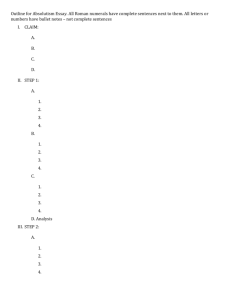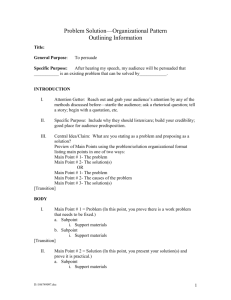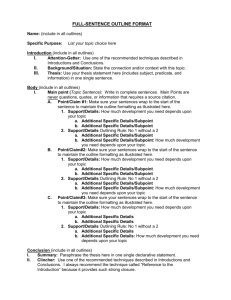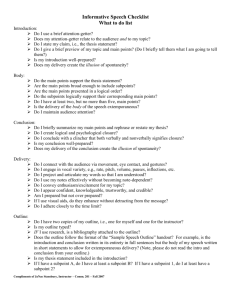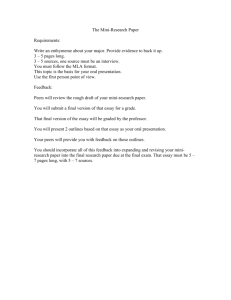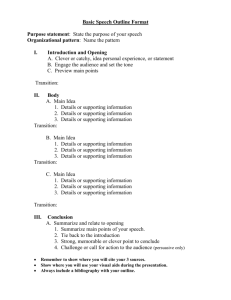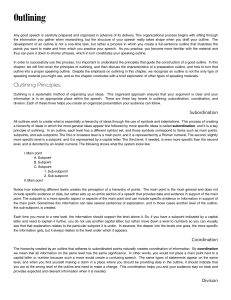Outlining Guide: Essay Structure & Research
advertisement
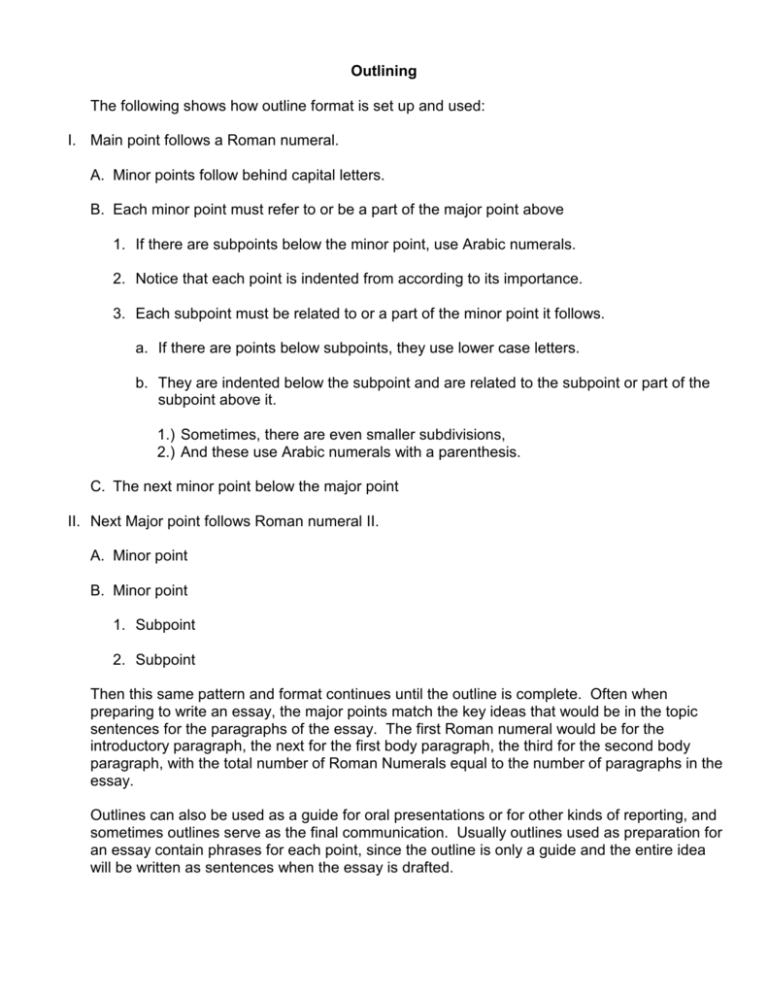
Outlining The following shows how outline format is set up and used: I. Main point follows a Roman numeral. A. Minor points follow behind capital letters. B. Each minor point must refer to or be a part of the major point above 1. If there are subpoints below the minor point, use Arabic numerals. 2. Notice that each point is indented from according to its importance. 3. Each subpoint must be related to or a part of the minor point it follows. a. If there are points below subpoints, they use lower case letters. b. They are indented below the subpoint and are related to the subpoint or part of the subpoint above it. 1.) Sometimes, there are even smaller subdivisions, 2.) And these use Arabic numerals with a parenthesis. C. The next minor point below the major point II. Next Major point follows Roman numeral II. A. Minor point B. Minor point 1. Subpoint 2. Subpoint Then this same pattern and format continues until the outline is complete. Often when preparing to write an essay, the major points match the key ideas that would be in the topic sentences for the paragraphs of the essay. The first Roman numeral would be for the introductory paragraph, the next for the first body paragraph, the third for the second body paragraph, with the total number of Roman Numerals equal to the number of paragraphs in the essay. Outlines can also be used as a guide for oral presentations or for other kinds of reporting, and sometimes outlines serve as the final communication. Usually outlines used as preparation for an essay contain phrases for each point, since the outline is only a guide and the entire idea will be written as sentences when the essay is drafted. When outlines are the final step in a writing process, the entries are usually written as sentences so that full ideas are presented in the outline format. Occasionally, outlines will actually include brief paragraphs, but that rarely occurs. When students write essays, they must be concerned with both WHAT they are going to include and HOW they are going to present the information. Doing both at the same time is a challenge. Preparing an outline ahead of time means that the writer can concentrate on how to present his information clearly. The content and the organization of the information (the WHAT of the essay) has already been established in the outline. The writer can then concentrate on HOW to say it in the clearest possible way. Sample Outline for an Essay Sample Outline Topic: Using the Library for Research Thesis: Knowing How to Use the Library Is Important When Doing a Research Paper. I. Introduction A. Introductory device B. Thesis C. Supporting sentences II. Introduction to the Library A. Programs of Orientation and Instruction 1. Pamphlets, Handbooks, Other Materials Distributed by the Library 2. Class Visits, Tours, Lectures, Courses B. Books about the Library (Examples: Gates, Cook, Patterson, Baker) III. The Central Catalog A. Methods of Locating Books in the Online Catalog 1. Author 2. Title 3. Subject B. Systems of Classification 1. Dewey Decimal System 2. Library of Congress System IV. Reference Works A. General Works (Dictionaries, Encyclopedias, Biographical Works, Yearbooks, Atlases, Gazettes) B. Specialized Dictionaries and Encyclopedias (In Alphabetical Order: Art, Astronomy, Etc.) V. Bibliographical Sources A. Indexes to Periodicals (Newspapers, Magazine, and Television News Broadcasts) B. Specialized Bibliographies and Indexes (In Alphabetical Order: Art, Biology, Etc.) C. Abstracts (In Alphabetical Order: Abstracts in Anthropology, etc.) VI. Location of Library Materials A. Main Collection 1. Open Stacks 2. Closed Stacks B. Special Sections 1. 2. 3. 4. 5. Folio-size Books Reserved Books Reference Works Periodicals Pamphlets, Clippings, Nonprint Materials VII. Other Library Resources and Services A. Microforms: Microfilm, Microcard, Microfiche B. Computer Assistance in Research C. Other Assistance (e.g., Copying Facilities, Interlibrary Loans) VIII. Conclusion – The Importance of Knowing about the Library, Its Materials and Services
